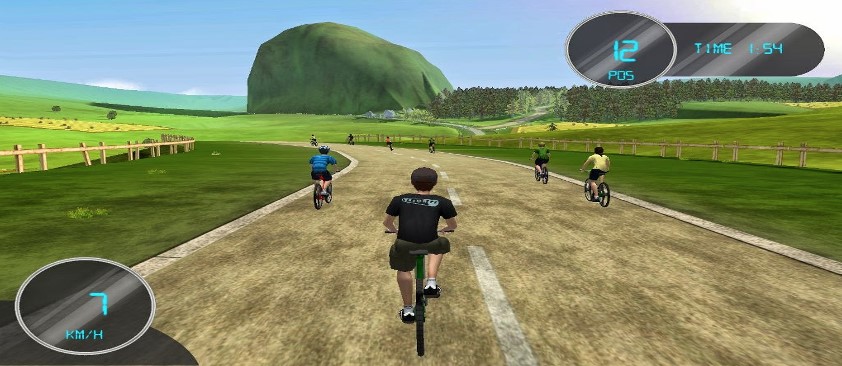Your cart is currently empty!

Tricking the Brain for Peak Performance
Tricking the Brain for Peak Performance
Hi.
I trust you and yours are well.
Thank you always for reading my books and free bi-monthly broadcasts, and using my tools and strategies for winning in a VUCA world with freedom, power and peace of mind.*
*You probably know by now: VUCA stands for Volatility, Uncertainty, Complexity and Ambiguity. Perhaps you also know the Chinese curse: May you live in interesting times 😉
Performance Experiment
In an experiment at Northumbrian University in England, Kevin Thompson and his assistant, Mark Stone, conducted an unusual experiment with bicyclists.
At their lab, Dr. Thompson and Mr. Stone had the cyclists pedal as hard as they could on their stationary bikes for the equivalent of 4,000 meters.
Once they had done this several times, the cyclists were clear on what their limits of performance were.
Then the scientists asked the cyclists to race against an avatar, an image of a cyclist in front of them on a computer screen.
Each rider saw two avatars: one was themselves, riding along in a virtual landscape at the speed they were actually riding on their stationary bike.
The other avatar was a figure of themselves riding at the speed of their personal best. Or so the cyclists were told.
In fact, the second avatar was programmed to ride faster than the real cyclist ever had: They expended 2% more energy and rode 1% faster, to be exact. Enough to make a significant difference in a competitive event between placing at the top or being somewhere behind in the pack.
Performance Factors
What is it that affects performance?
Money does not, Jo Corbett found. Dr. Corbett, a senior lecturer at the University of Portsmouth, also in England, offered athletes money if they could beat their best times. They could not.
By contrast, competition does seem to influence performance, Dr. Corbett found. On a screen, he showed each cyclist a picture of a competitor, who was in fact themselves at their personal best.
The cyclists pedaled furiously to beat their “competitors,” and did beat them.
But when the cyclists knew from the start that their avatars would be going faster than they ever had, they gave up from the get-go and did not even attempt to beat their “competitors.”
Dr. Thompson said that coaches can eke out extra performance from athletes by using small deceptions. For example, the coach can tell the athlete that the distance to run is shorter than it is in fact. Or that their time is a touch slower than it actually is.
It’s a risky approach, though, he added. Even small deceptions can erode the trust between coach and the one being coached.
Performance Management Lessons
Can we draw lessons from this experiment for performance management in any field of human endeavor? On the other hand, do such small deceptions work in the long run? And are they desirable, or even permissible?
I have long known about the power of mind over matter from my own marathons: My speed coach used to always say that races are 10% physical, 90% mental. Now, in an unusual experiment at Northumbrian University in England, competitive cyclists went beyond their limits of performance. How? The researchers tricked the athletes’ brains into believing they were not yet at their peak.
Ever since I ran marathons in the 1990s (once, but only once, breaking the 3-hour barrier in the New York City Marathon, a feat that to me is impossible today), I have been wondering if I could manage my mind such that I could beat my personal best.
Roger Bannister, the first runner to break the 4-minute mile, once said: “It is the brain, not the heart or the lungs, that is the critical organ. It’s the brain.”
The advantage of running a marathon, or of training 50-plus miles (80-plus kilometers) each week, summer and winter, is that you can engage in thought experiments. At least I did. (I don’t know what other people thought about during those grueling training runs.)
So sometimes I would imagine I was not running but riding on a train and seeing the landscape pass by silently outside my window. Very pleasant.
Another time I joked around with another runner, who happened to be a beautiful woman, for almost 20 miles.
Once, in the 1994 Marathon, I came across the Queensboro Bridge and heard the roaring of the crowd in the distance, greeting the runners as we turned off the bridge onto 1st Avenue in Manhattan. I imagined myself being Bruce Springsteen.
The point is, you do whatever works (as long as it’s within ethical and legal boundaries).
I noticed—and I still do this today when I swim long distances—that I could either focus on surviving the workout or the race, which did not make it any easier, quite the contrary.
Or I could focus on something else, e.g. on my posture. I could even not focus on myself at all. A sage once said, “Don’t think less of yourself—think of yourself less.” I could focus on the people along the road, the kids handing me cookies (which of course I didn’t accept, because the sugar high was a dangerous thing in a marathon). It’s all a question of what you pay attention to
How far can we take this mind-management to produce top performance?
What do you say? Have you ever tricked your brain or managed your mind to elicit peak performance? Do you think this type of trickery is even desirable, or does it lead to unsustainable burnout? I look forward to reading your comments, additional details or questions via email at coach@maximizeu.life

Leave a Reply